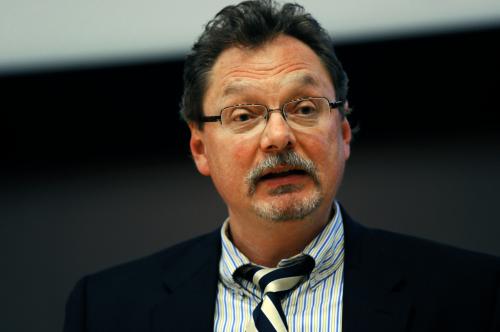What is important [for Putin] is to counter with something to restore the credibility of leadership, to show him strong and not weak […] It is possible to blame Ukraine, but then..."
Pavel Baev is a nonresident senior fellow in the Center on the United States and Europe at Brookings and a research professor at the Peace Research Institute Oslo (PRIO). He specializes in Russian military reform, Russia’s conflict management in the Caucasus and Central Asia, and energy interests in Russia’s foreign and security policies, as well as Russia’s relations with Europe and NATO.
Baev graduated from the Moscow State University in 1979 with a master’s degree in political geography, and worked in a research institute in the former USSR Ministry of Defense. After receiving a doctorate in international relations from the Institute for the U.S. and Canadian Studies, Moscow in 1988, he worked with the Institute of Europe in Moscow until October 1992, when he joined PRIO. From 1995 to 2001 he was a co-editor of Security Dialogue, a quarterly policy-oriented journal produced at PRIO. From 2000 to 2004, Pavel was the head of the Foreign and Security Policies program. He held the NATO Democratic Institutions Fellowship from 1994 to 1996.
Baev is the author of several books, including “The Russian Army in a Time of Troubles” (SAGE, 1996) and “Russian Energy Policy and Military Power: Putin’s Quest for Greatness” (Routledge, 2008). Some of his most recent reports include “The limits of authoritarian compatibility: Xi’s China and Putin’s Russia,” Brookings Institution, 2020; “The Iranian Revolution at Forty” (with Suzanne Maloney et al), Brookings Institution, 2020; “Transformation of Russian Strategic Culture: Impacts from Local Wars and Global Confrontation,” French Institute of International Relations, 2020; “Russia’s Syrian Predicament Grows Unmanageable,” PONARS Eurasia Memo, 2020; “New Perspectives on the Black Sea Theater in Russian Strategic Culture,” George C. Marshall European Center for Security Studies, 2019; “Russian Nuclear Modernization and Putin’s Wonder-Missiles: Real Issues and False Posturing,” French Institute of International Relations, 2019; and “An ambiguous partnership: The serpentine trajectory of Turkish-Russian relations in the era of Erdoğan and Putin” (with Kemal Kirişci), Brookings Institution, 2017.
Baev’s articles on the Russian military posture, Russian-European relations, and peacekeeping and conflict management in Europe have appeared in Armed Forces & Society, Cambridge Review of International Affairs, Contemporary Security Policy, European Security, International Peacekeeping, Jane’s Intelligence Review, The Journal of Peace Research, The Journal of Slavic Military Studies, Problems of Post-Communism, Security Dialogue, Studies in Conflict & Terrorism, and The World Today. He also has a weekly column published in the Eurasia Daily Monitor and is the author of the blog, Arctic Politics and Russia’s Ambitions.
-
Areas of Expertise
- Russian military reform
- Russia's conflict management in the Caucasus and Central Asia
- Energy interests in Russia's foreign and security policy
- Russia's relations with Europe and NATO
-
Current Positions
- Research Professor, Peace Research Institute, Oslo (PRIO)
-
Past Positions
- Head of a Working Group, Center for the Study of Civil War (2002-2005)
- Head of PRIO Foreign and Security Policy program (1997-2003)
- Editor, Security Dialogue (1995-2001)
- Institute of Europe, Soviet/Russian Academy of Sciences, Moscow (1988-1997)
- Research Institute, USSR Ministry of Defense (1979-1988)
-
Education
- M.A., Economic and Political Geography, Moscow State University, 1979
- Ph.D., International Relations, U.S. & Canada Institute, USSR Academy of Sciences, Moscow, 1988
Media and Appearances
This hot potato is good fun for a while, but Putin is definitely looking for an elegant way to throw [the Snowden affair] to somebody else’s lap.
This sort of development objectively puts Putin on the course of a kind of self-isolation [and] greater tension with the West, because, for the West, opposition forces in Russia [are]..."
